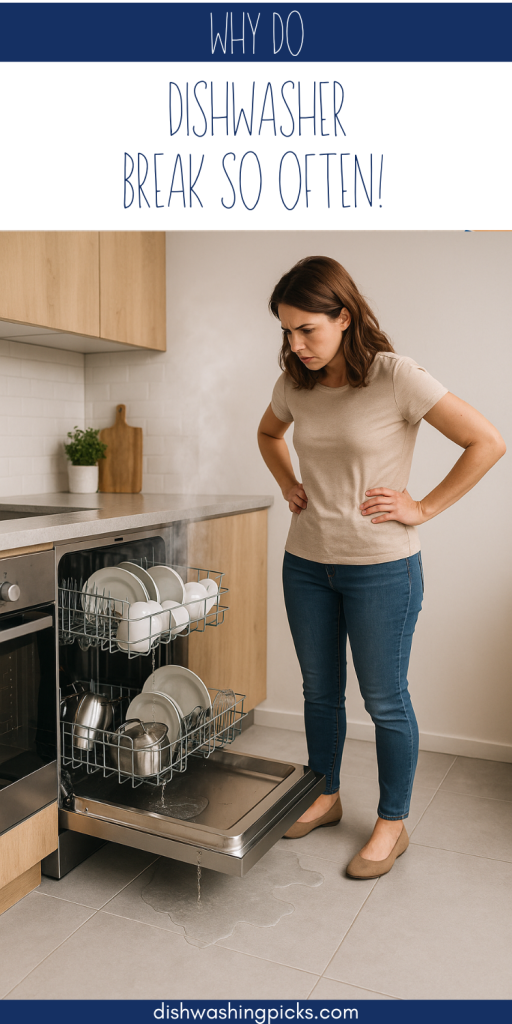
The Love-Hate Relationship with Dishwashers
Let’s be real for a second—dishwashers are amazing… until they’re not.
You load it up, hit start, walk away feeling like a domestic wizard—and then boom. It doesn’t drain. Or it makes a noise like a jet engine. Or worse… it leaks like it’s auditioning for a plumbing nightmare.
So you might be wondering:
Why do dishwashers seem to break so often? Are they just fragile by nature? Or are we doing something (unknowingly!) to sabotage them?
Spoiler: it’s a little bit of both. But don’t worry—we’re about to break it all down.
The Truth About Modern Dishwashers
Let’s start here: today’s dishwashers are not built like the tanks of the 1990s. Modern machines are designed to be energy-efficient, sleek, and smart—but that also means they’re packed with more delicate sensors, electronics, and moving parts.
And you know what that means? More things that can go wrong.
Think about it this way:
Would you expect a smartwatch to be as rugged as an old-school analog Casio? Probably not. Same goes here.
Common culprit: Those sensors that help save water or detect food particles? Great for the planet. Not so great when they get gunked up or glitch out.
User Error (Yeah… It Happens)
Okay, time for a little tough love. Sometimes—it’s us.
Yup, user error is a major cause of dishwasher problems.
Ever skipped pre-rinsing your dishes entirely? Or overloaded the racks like it’s a game of dishware Jenga? Or used regular dish soap instead of actual dishwasher detergent? (Don’t worry—we’ve all been there.)
All of those habits can stress the machine or outright damage it. Here’s a quick list of everyday no-nos:
- Using too much detergent (leaves residue and clogs parts)
- Not cleaning the filter (hello, grease buildup!)
- Putting in items that aren’t dishwasher safe (plastic warping, anyone?)
- Blocking spray arms with poor loading
Little things. Big impact.
Imagine this: you’re trying to run a marathon in flip-flops while someone’s tossing potato chips at your head. That’s kind of what your dishwasher feels like when it’s mistreated.
Hard Water Woes
Hard water is sneaky. It’s not just a problem for your skin or hair—it’s brutal on your dishwasher too.
Over time, minerals in hard water build up inside the machine—on heating elements, in valves, even inside the sprayer arms. This can mess with water flow and heat performance, and even shorten your dishwasher’s lifespan.
Try thinking of it this way: It’s like cholesterol for your dishwasher’s arteries.
A quick fix? Use a dishwasher cleaner monthly, and consider adding a water softener if hard water is a chronic issue in your area.
Cheap Parts & Fast Manufacturing
Manufacturers are in a race to make affordable appliances that look amazing and sell well. But in that race? Quality sometimes takes a back seat.
Many dishwashers (even big-name brands) use plastic components in parts that really should be metal—like spray arms, pump parts, or hinges. These parts wear out faster, especially with regular use.
And let’s face it—today’s appliances are designed for replacement after a decade, not a lifetime.
Age Matters (But Not How You Think)
Here’s a fun fact: dishwashers today are more efficient than ever. But on average, they last around 7–12 years—and that’s with regular maintenance.
Once your unit hits that 8–10 year mark, expect more hiccups. Seals wear out. The pump might get noisy. Control panels become… moody.
But don’t panic—many of these issues are fixable. And with a little TLC, your dishwasher can still go the distance.
So, What Can You Do?
If your dishwasher seems to be plotting against you, it might not be entirely its fault—or yours. It’s usually a mix of tech complexity, daily habits, water quality, and good ol’ wear and tear.
But here’s the good news:
A bit of prevention goes a long way. Clean the filter monthly. Use the right detergent. Give it a rinse now and then. Be gentle with how you load it.
Next up, let’s talk “How to make your dishwasher last longer”—because who wants to buy a new one every few years?
